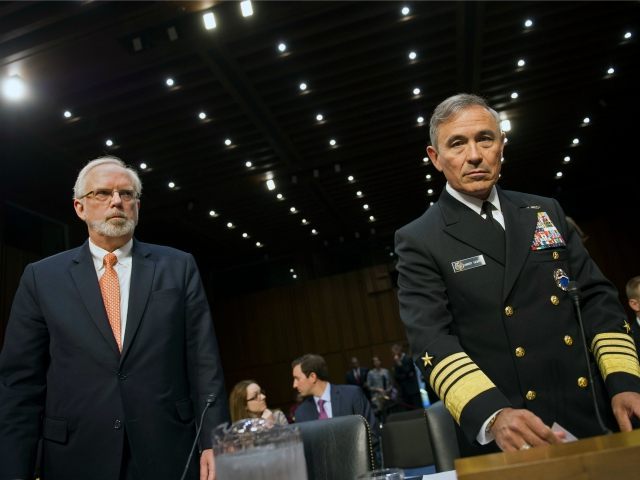The U.S. Pacific Command (PACOM) chief and the assistant secretary of defense for Asian and Pacific security affairs expressed concern about China’s declining influence over volatile and nuclear-armed North Korea.
Navy Adm. Harry B. Harris, Jr., the PACOM commander, and Amb. David B. Shear, the Pentagon’s assistant secretary for Asian-Pacific affairs, shared their anxieties on Thursday while testifying before the Senate Armed Services Committee during a hearing titled “Maritime Security Strategy in the Asia-Pacific Region.”
Adm. Harris described North Korea as the “greatest threat” he is facing in the Pacific.
He told lawmakers that he is greatly concerned about North Korea’s Supreme Leader Kim Jong-un “seeking the means to miniaturize” the nuclear weapons he has at his disposal and “deliver them intercontinentally.”
Earlier this week, in a statement disseminated by the state-run Korean Central News Agency (KCNA), North Korea warned that “if the U.S. and other hostile forces persistently seek their reckless hostile policy towards the DPRK and behave mischievously, the DPRK is fully ready to cope with them with nuclear weapons any time.”
DPRK is an abbreviation of North Korea’s official name, the Democratic People’s Republic of Korea.
North Korea’s leader has “20 to 30 thousand artillery pieces within the range of [South Korea’s capital] Seoul amounting to several hundred thousand rockets that place 28,000 American troops plus their families and the 700,000 American citizens who live on the Korean peninsula in danger.”
“So I view the threat from North Korea very seriously. I think that China’s influence on North Korea is waning or China doesn’t have the influence on North Korea that it had in the past. So that is also an area of concern,” he added.
Adm. Harris pointed out that North Korea is one of the “many areas” where the U.S. has received cooperation from China.
Communist China has been able “to mitigate the behavior of North Korea,” said the admiral. “We’re not seeing that today and that causes me great concern.”
Echoing Adm. Harris, Amb. Shear noted that China has conceded that their influence over North Korea, particularly under the leadership of Kim Jong-un, is in decline.
“We exchange views with the Chinese on North Korea regularly,” Shear told lawmakers. “I did so in Beijing with my Chinese PLA [People Liberation’s Army] counterparts just 10 days ago.”
“The Chinese reiterated to me, as they have in the past, that their influence with North Korea is limited particularly under the new regime,” he continued. “During the recent crisis related to the North Korean provocation on August 4, it wasn’t clear to us that the Chinese had a lot of contact with the North Koreans or were able to significantly influence them.”
Shear told the Senate panel that he thinks China is worried about its dwindling influence on its neighbor North Korea.
Adm. Harris said that although he has been critical of Chinese behavior in the past, he does not hesitate to acknowledge when China has been helpful.
He mentioned that China has played an essential role in removing chemical weapons from Syria; supporting counter-piracy efforts off the Horn of Africa; searching for Malaysian Airlines Flight MH370 off Australia; and helping to the Philippines when it was struck by a typhoon in November 2013.
“So we should acknowledge those good things that China has done,” said Adm. Harris, adding that the United States should also hold them “accountable for those negative things they do.”
Both Harris and Shear expressed disapproval of China’s land reclamation activities in the South China Sea.
The top Pentagon officials said they disagree with Vice Adm. Yuan Yubai, commander of the North Sea Fleet for the People’s Liberation Army Navy, claiming that the South China Sea belongs to China.
Adm. Harris said he is “confident” in America’s ability to take on China militarily even though Beijing is investing in modernizing its army while the United States is downsizing theirs.

COMMENTS
Please let us know if you're having issues with commenting.